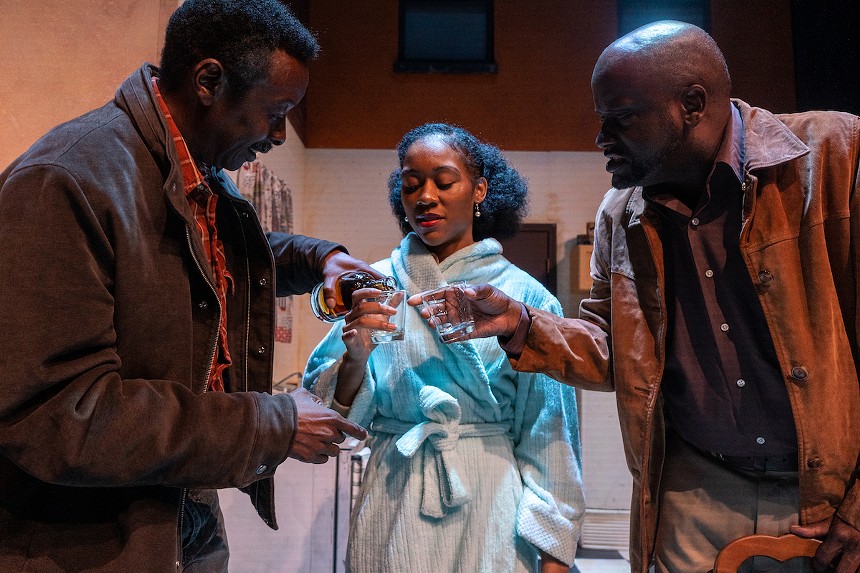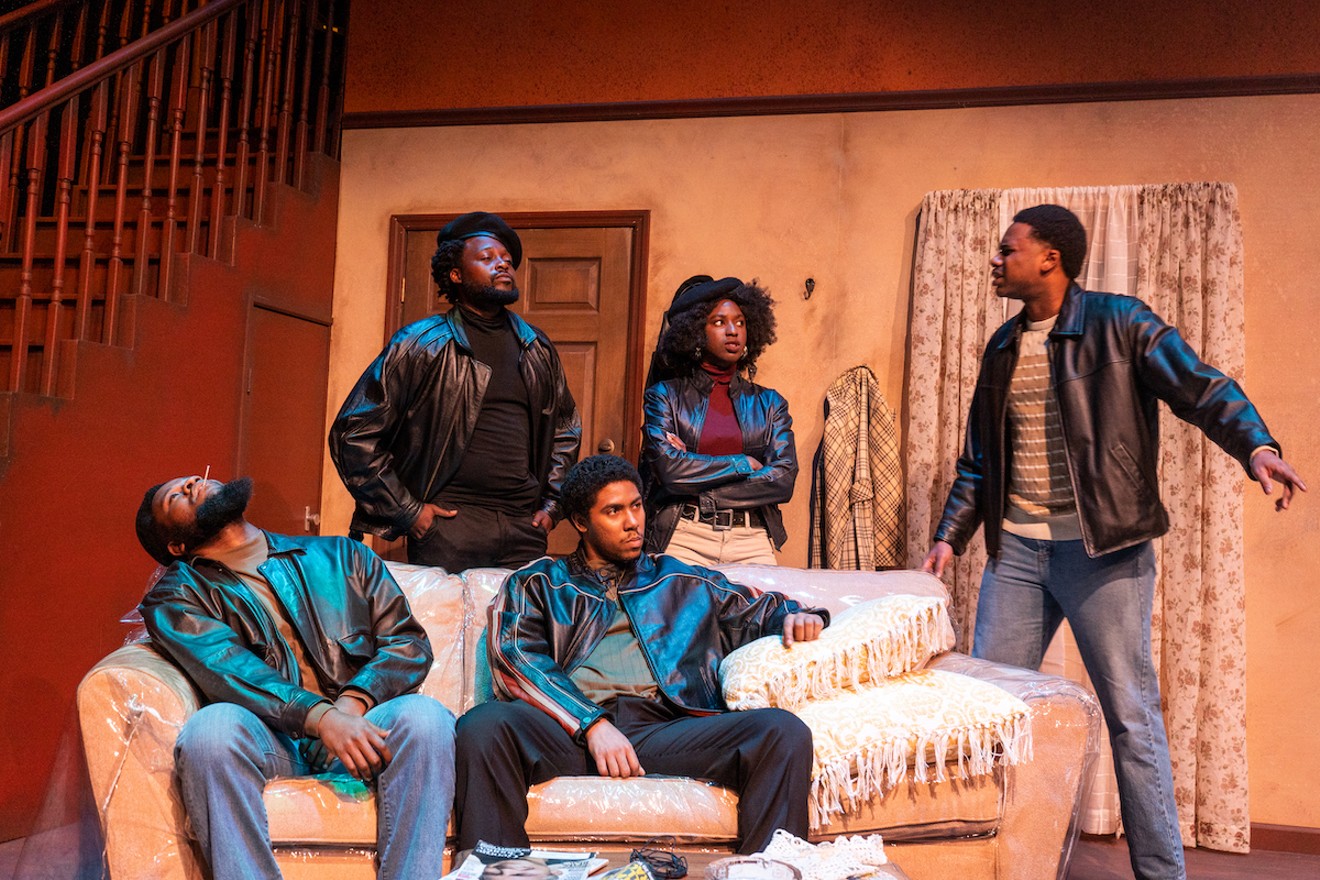For its Black History Month season opener, M Ensemble has given a new generation of actors the chance to explore and embody this 51-year-old piece of theater history.
Still led by Patricia E. Williams and Shirley Richardson, two of its three founders, M Ensemble has continued to enrich South Florida's cultural life with professional productions of great Black plays and lesser-known (or less often produced) ones. Despite its Tony Award, The River Niger falls into the latter category. It is resonant and relevant but not enduringly impactful like A Raisin in the Sun, Ceremonies in Dark Old Men, or A Soldier's Play, for example.
Staged by Carbonell Award-winning actor-director André L. Gainey, Walker's sprawling drama takes place inside a Harlem brownstone that the extended Williams family calls home.
Reflective of its early '70s era, the script explores issues that endure, disturb and haunt us still — the sacrificing of dreams, expectations we place on our offspring, and the different ways Black men and women cope. The fraught, sometimes tragic relationship between the Black community and law enforcement — a story that never seems to end — is also part of The River Niger.
With multiple storylines that intertwine and at a running time of more than three hours (a single brief intermission comes more than two hours into the action), the production needs strategic tightening and a quicker pace. The playwright's device of having most scenes or segments begin with someone pounding on a door becomes so predictable that you start waiting for the next character to arrive.
Those 11 characters and the way this cast plays them, however, largely keep the audience engaged.

Chat Atkins, Tyquisha Ariel Braynen, and Keith C. Wade make a toast in M Ensemble's The River Niger.
Photo by Christa Ingraham
His stalwart, loving wife Mattie (Jade L. Jones, who radiates a loyal warmth) has been complicit in John becoming an alcoholic. She pretends to fuss and keep him in line, but she knows how much a lifetime of sacrifice has a cost and wants him, in his 60s, to grab all the happiness he can.
Mattie's mother, Wilhelmina Brown, played with masterful comedic flair by Carbonell winner Carolyn Johnson-Davis, is there to get in everybody's business, pass judgment and compete with her son-in-law at sneaking hidden booze. She lives there, but their Jamaica-born next-door neighbor Dr. Dudley Stanton (Keith C. Wade, another M Ensemble veteran who is an adept grounding force in this production), practically does, popping in and out to trade joking insults, debate politics, drink, and loan John a little money when Mattie isn't looking.
Everyone is waiting for a homecoming, the return of John and Mattie's 25-year-old son Jeff (the magnetic Roderick Randle, so adept at conveying Jeff's quicksilver emotional changes) from his time in the U.S. Air Force as a navigator. Among the surprises awaiting Jeff is Ann Vanderguild (Tyquisha Ariel Braynen), a South African-born nurse who met Jeff in Canada and aims to marry him.
Jeff's old Harlem gang is less welcome, a mixture of militants inspired by the Black Power movement and armed thugs ready to take what they want. Leader Big Moe Hayes (Jean Hyppolite) wants to draw his lifelong friend Jeff back into the group's police-baiting criminal life. Jeff is determined to take on the law school part of his father's abandoned dream and change his community that way.
Inevitably, tensions mount and explode. The gang members — junkie Skeeter (Martin Davis), sexual predator Chips (Xavier Latorture), and volatile Al (Kedar Myers) — bring danger with them every time they come through the door, though Moe's girlfriend Gail (Nairobi) proves to be a positive force.

Roderick Randle and Tyquisha Ariel Braynen in M Ensemble's The River Niger
Photo by Christa Ingraham
Richardson and Chasity Hart collaborated on the costumes, making Braynen's Ann look particularly '70s chic. Quanikqua "Q" Bryant's lighting underscores the emotional content of Jeff's eventual confessional about his Air Force experience, and Marcus Banks threads a subdued yet ominous bass through the show.
Something else you should know about The River Niger, though, particularly since a number of young kids were part of the opening night audience: Walker's language, which can be poetic and quite funny, is also shocking and offensive at times.
John and Dudley go at each other verbally, tossing insults, hauling out the n-word, and far, far worse. They're not mad, just kidding each other in a nonstop roast, but that's how they do it. The sexual talk and threats among the younger characters are equally raw. Consider yourself warned.
The River Niger still needs to gel. The actors have most, but not all, of their lines down. Braynen's supposed South African accent sounds nothing like one, and Nairobi is too soft-spoken. More tightening and more confidence should make for a better experience for the actors and the audience.
Walker's most celebrated play may not have stood the test of time as firmly as A Raisin in the Sun and others. But watching the final scene, taking in the aftermath of a sacrifice as blue and red police lights whirl outside, your heart sinks as you acknowledge that a half-century later, such tragedies go on and on and on.
– Christine Dolen, ArtburstMiami.com
The River Niger. 8 p.m. Thursday through Saturday and 3 p.m. Sunday through February 26, at the Sandrell Rivers Theater, 6103 NW Seventh Ave., Miami; 305-200-5043; themensemble.com. Tickets cost $36.











